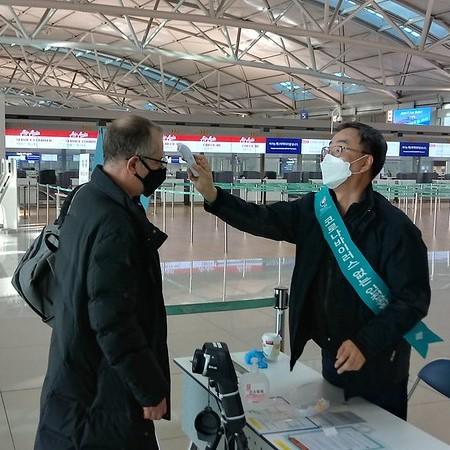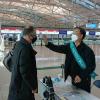A COVID-19 resurgence in South Korea, the latest country to report a new spike in cases, prompted warnings from government officials today that that the country may need to reimpose distancing measures.
The pandemic total today climbed to 21,761,813 cases, with 776,751 deaths, according to the Johns Hopkins online dashboard.
Korea cases include another big church cluster
South Korea reported 197 new cases today, mostly in Seoul, the fourth day in a row the country reported cases in the triple digits, Reuters reported. At a briefing, Korea Centers for Disease Control (KCDC) Director Jeong Eun-kyeong, MD, MPH, said South Korea is in the initial stages of large-scale transmission.
If cases don't subside by the end of the week, the government will step up distancing measures such as closing public buildings and banning large gatherings, which have already been imposed for Seoul and Gyeonggi province, Kim Gang-lip, the vice health minister, said at a briefing, Korea Times reported.
So far, 319 cases have been linked to an outbreak at Sarang Jeil Church in northern Seoul. The cluster is the country's second biggest, behind a cluster in Daegu earlier this year that resulted in more than 5,000 cases. According to South Korean media reports, the church hasn't fully cooperated with outbreak investigators, and its leader has tested positive for the virus.
New Zealand, Australia upticks
In New Zealand, another country that successfully contained the virus and is currently battling a resurgence, Prime Minister Jacinda Ardern today announced that the country's general election will be postponed a month, from September 19 to October 17, due to a lockdown in Auckland, home to a third of the country's population, Reuters reported.
The country's health ministry today reported nine new cases, seven with confirmed links to the recent cluster and two with suspected links. So far, there are 58 cases in the cluster. Officials are also managing 20 imported cases involving people who are isolated in quarantine.
Testing on surface samples from a refrigerated storage facility are under way, and some supermarket customers have raised concerns about the risk of infection through food or food packaging. "A reminder that New Zealand Food Safety has reviewed the most recent science from around the world about the risk of being infected with COVID-19 through contact with food or food packaging. To date, there is no evidence of transmission via food or food packaging," the ministry said.
Meanwhile, Australia reported 25 deaths today, marking its deadliest day, Bloomberg News reported. The country also reported 282 new cases, down from the daily counts in the 700s at the end of July. Yesterday, Victoria state announced that it extended its state of emergency until the middle of September.
In Asia, Hong Kong's government extended distancing measures another week, with 44 new cases today, Reuters reported. The region began experiencing a third spike in COVID-19 activity in early July, and cases have declined from triple-digit numbers, Reuters reported. China confirmed 22 new cases today, all of them imported, the National Health Commission said. Also, it noted 37 more asymptomatic, cases, all but one of them imported.
Lebanon reports steep rise
Lebanon's acting health minister, Hamad Hassan, today declared an alert about a sharp rise in COVID-19 cases, with 456 new cases today, Reuters reported. He pushed for a 2-week shutdown to slow the surge in cases.
The country's COVID-19 cases were rising before the Beirut blast that killed at least 178 people, displaced 250,000 people, and overwhelmed the health system.
In other global developments:
- In Europe, France reported more than 3,000 cases yesterday, the second day in a row that cases topped 3,000, and health officials are expected to propose that people wear masks in shared workspaces. In the Czech Republic, also experiencing a rise in cases, the government is reimposing a mask rule for people riding public transport and for those in indoor public spaces, part of efforts to curb the spread of the virus when school starts on Sep 1.
- Worried about the supply of controlled drugs, the International Narcotics Control Board, the World Health Organization, and the United Nations Office on Drugs and Crime issued a recent statement urging countries to ensure that the purchase and supply of drugs meets the needs of patients with COVID-19 and those who need them for other medical conditions. They noted that the pandemic has interrupted the supply chain, which was already experiencing problems before COVID-19. "It is critical that access to essential health services and medications not be forgotten or de-prioritised during this pandemic," the group wrote.






















